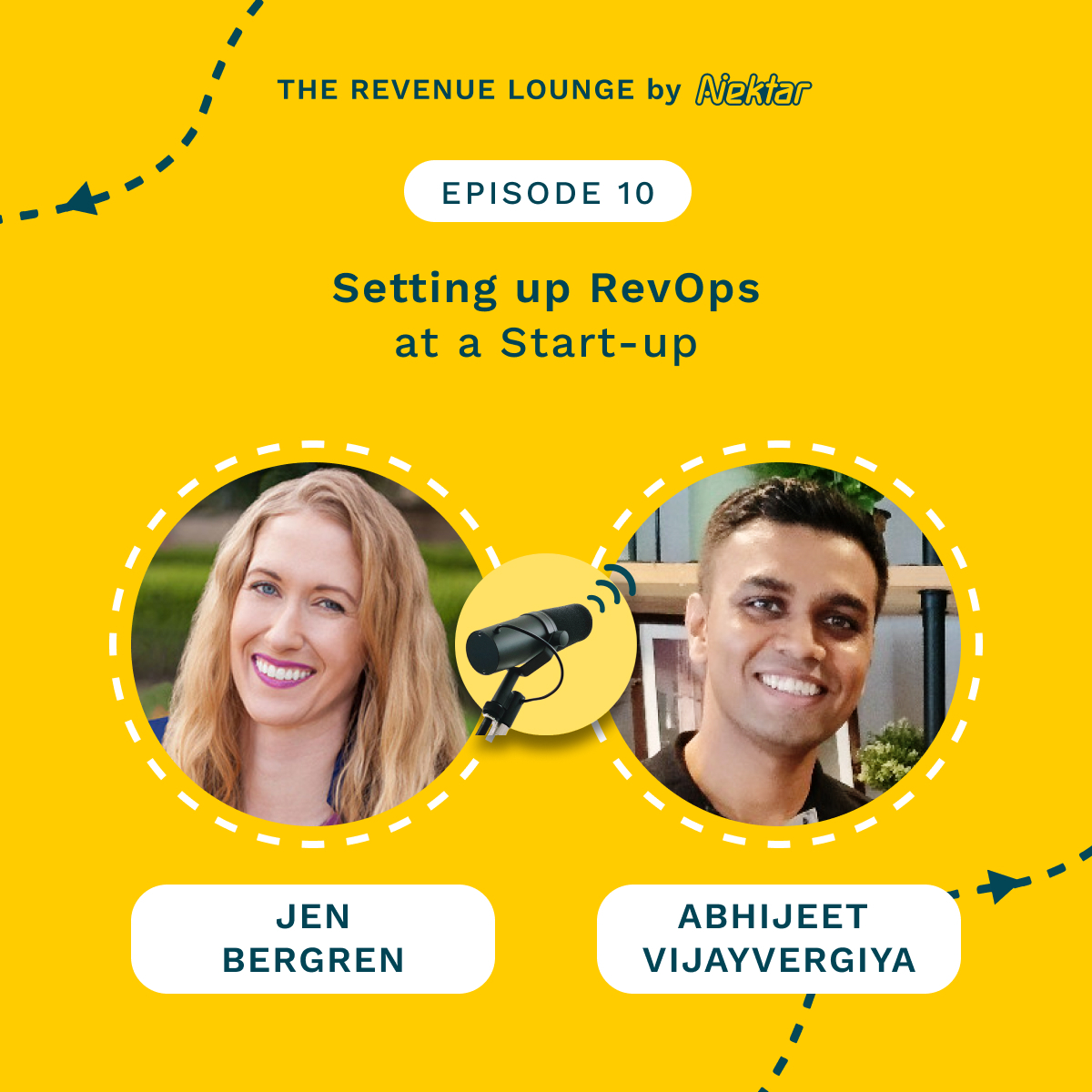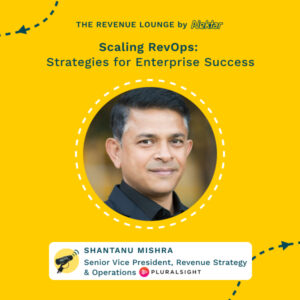Ep #6: Using Customer Data to Improve the B2B Customer Journey ft. Leore Spira
May 10, 2023
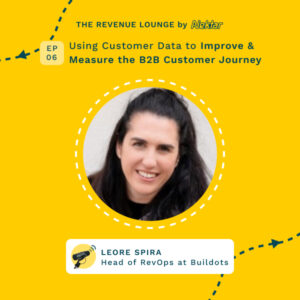
About
The Revenue Lounge
The podcast covers stories from leaders across RevOps, Sales, Customer Success, GTM, Data and Marketing about what drives these functions and what advice they would share with our listeners. With 3 seasons recorded, the podcast currently features 50+ enterprise leaders in the B2B SaaS domain. Tune in to hear from the best in the business
Welcome to Season 2 Episode 6 of The Revenue Lounge Podcast by Nektar.ai – A series of interviews with top Revenue Operations leaders on what drives the function and what keeps them going!
Episode Host – Abhijeet Vijayvergiya
https://www.linkedin.com/in/abhijeet-vijayvergiya-2571056/
Episode Guest – Leore Spira
https://www.linkedin.com/in/leorespira/
Podcast Details:
Podcast page – https://bit.ly/3UznQ4U
Spotify – https://open.spotify.com/show/3DUOqnTpPOJ2xbyl7HdgN3
Google Podcasts – https://podcasts.google.com/u/0/search/the%20revenue%20lounge
Apple Podcasts – https://podcasts.apple.com/in/podcast/the-revenue-lounge/id1645044872
Episode Details:
Succeeding in current times requires B2B businesses to have a maniacal focus on the customer. This means revenue leaders driving businesses must have full visibility into the various stages of the customer journey. And meet them where they are, in the medium of their choice and with the exact kind of information they might be looking for.
This is possible by having access to customer data. Business leaders need to be able to capture this critical customer data, the insights from which can be used to run predictable revenue engines.
So how can RevOps teams approach customer data in a way that helps them generate more revenue for their business? Let’s explore with our guest today.
We have Leore Spira who is currently heading Revenue Operations at Buildots. She is a globally recognized RevOps leader with a track record of establishing and building RevOps departments in multiple start-ups. She is also the Co-founder of The Optimizers, the 1st Israeli professional community for operations leaders (recognized by Startup Nation).
Want to learn more about Nektar?
Talk to our team – https://bit.ly/3MishjZ

Succeeding in current times will require B2B businesses to have a maniacal focus on the customer. This means revenue leaders driving businesses must have full visibility into the various stages of the customer’s journey and meet the customer where they are in the medium of their choice and with the exact kind of information they might be looking for.
[00:00:18] This is possible by having access to customer data. Business leaders today need to be able to capture this critical customer data, the insights from which can be used to run predictable revenue engines. So how can RevOps teams approach customer data in a way that helps them generate more revenue for their business?
[00:00:35] Let’s explore with our guest today. We have Leore Spira, who’s currently heading Revenue Operations at BuildDots. She’s globally recognized Revops leader with a track record of establishing and building rev op departments in multiple startups. She’s also the co-founder of the Optimizers, the first Israeli professional community for operations leader recognized by Startup Nation.
[00:00:55] Leore, welcome to the Revenue Lounge Podcast. Thank you so much for joining us today.
Thank you so much for [00:01:00] inviting me, and thank you for the nicest intro I’ve ever had in a podcast.
I still remember how kind you were three years back when I first interacted with you, when you helped me with early feedback on Nektar.
[00:01:11] So, yeah, I mean, from that day till today, I was just waiting to have you back on the podcast. So great to have you today, and thank you for the work you’ve been doing for the Revops community. So let’s get started. My first question as we get into this would be just to know a little bit about you. If you could just start with your story, your background.
[00:01:29] So that our listeners get to know a bit more about you.
It’s a good question. So first of all, I’ll start from the end. I don’t know how I became a revenue operations, uh, leader and expert, but I guess life brought me here. Basically, I studied law. My parents dreamed with me becoming a lawyer in real estate, by the way.
[00:01:49] Yeah. So I studied law and I did my internship in one of the biggest firm here in Israel. Then I passed the bar exam, but. I felt that something wasn’t right from the beginning, [00:02:00] so I kind of broke my parents’ dream and just shifted my career into a different path. I joined a non-profit organization as part of the marketing team, and I was responsible also for the CRM there.
[00:02:14] This is how I first met a CRM platform with Salesforce and started to think how to leverage. Such tool, especially in a nonprofit organization when you have limited budget. So I was responsible not just for the marketing, but also for building processes and understanding the organization’s strategy. And this is where I started my master’s studies about, uh, government strategy and marketing.
[00:02:40] And after two years there, I wanted to do more and I wanted to build my career. So I transitioned again and changed my career path and, um, Joined a HAI tech company. Actually it was a corporate, so it, I think before joining startups, I, I saw how. Large organizations [00:03:00] actually have stable processes. How they measure, how they operate, how they established, like very strong go-to market teams.
[00:03:08] I joined the marketing team, but very soon I transitioned into sort of a marketing supporting sales, sales operations position. And after a few years there, I’ve. For, for a startup. I started as sales operations as I found it more, I guess, challenging and intriguing. And from there it was sales, sales and marketing operations.
[00:03:32] Later on it was sales and marketing operations, but more of a revenue operations because it also was with. CS operations, but back then there was no such roles. And I’ve established three departments in three different startups and most of them are revenue operations. But in the past, I think three years, my title has TR also transformed into revenue operations because this is where.
[00:03:56] The ecosystem started to speak about not just what is [00:04:00] revenue operations, but also understood that it’s not just marketing or sales operations more, it’s like the customer journey and Yeah, and somehow I got here and yeah. And I guess that this is also why. I founded the community here in Israel because especially in Israel, we have very like techy startup, NA nation, uh, ecosystem.
[00:04:22] And we have a lot of technology. We have a lot of go-to-market positions. We have a lot of r and d positions, we have a lot of product positions, but operations was something that nobody really understood what it means. And I’ve always felt like a lonely wolf for the company because, Usually I like built everything from scratch and by myself.
[00:04:43] Later on. I had a team, but a very small one and usually worked with freelancers, but now I think it’s nice to see how it evolved into like a whole new. Topic and a mystery, but also, you know, companies understand exactly how [00:05:00] critical we are. So it’s, yeah, that’s one of the most interesting intros and journeys I’ve heard of people getting rev op.
[00:05:07] So being from the law background, I’m sure you’ll be great with negotiations with the go to market teams, which continue to pull the DevOps teams into different directions with different priorities. So I hope the law background comes handy in some situations. This is my power. This is my power. Yeah, that’s your superpower.
[00:05:26] Yeah. So let’s move on to Build Dots. Would love to hear about your role here, specifically how the ops team structured and if you can dive a little bit deeper there, that’ll be great. Sure. So BDO is a construction tech company and you know, I had a conversation with our CEO a month ago and he asked me like, how is our product?
[00:05:45] And I told him that. The reason that I, usually, I joined companies by the way, not just by the role, but also by the product, you know, and what we’re selling and improving, you know, in the ecosystem. And what we’re doing is we’re actually building a CRM for a very, [00:06:00] very traditional industry, the construction industry, right?
[00:06:03] So it’s really. Easy for me to resonate with not just what we’re doing, but also with the messaging and also with the mission that I came and joined and for what I came and joined Build Dots. Basically, I joined a year and a half ago. We had no. Real go-to-market teams. So I joined like at a very early stage together with the go-to-market leaders to build everything from scratch and not just the infrastructure of our, and build the tech stack, but also build the processes and then train the team and hire new sales reps, marketeers and CSMs to make sure that they’re all aligned and.
[00:06:45] Basically break the silos and ensure that we’re not speaking the same language, but also we are connecting the dots along the process. So we did everything from scratch, all of us together. So very, very challenging, but also [00:07:00] super exciting. And I think it was a great opportunity because. I think it was the first time that, and I’ve established two departments in the past, but it was different because I inherited the systems.
[00:07:11] I inherited some of the broken processes and I made improvements because most of what they had in place was built by usually sales or marketing. And then I came and. Try to fix and improve everything to first ensure scale and second, you know, make sure they are building a healthy customer journey. But here at Buildouts, since I think the CEO really believed in and still believing, in building, you know, the like investing the operations and the processes and the communication that we have with one another.
[00:07:48] To ensure that we not just, you know, bring the company into scale, but also we’re making sure that we are all aligned with one another. Because eventually this is what we’re selling to our customers. We’re selling them [00:08:00] like, you should start with a digital transformation and you should bring technology to your day-to-day because this would create alignment.
[00:08:08] This would create a single source of truth. This would create a holistic environment and. Connect the dots between one department to the other or with, you know, how you manage a project and, yeah, and basically, so I’m doing what we’re also selling to our customers, so it’s a quick win from several angles.
[00:08:30] So it’s, it’s really nice. Very interesting. And how big is the team on the Rev side? So we are now three as we’re growing, and this is how I see it, we grow as the teams grow. So our go-to market are like a large team, but not so much because we do believe in efficiency and we do believe in productivity, and this is why they have RevOps for us to, [00:09:00] you know, to help them measure and see that you don’t need.
[00:09:03] A huge sales department to generate millions of dollars. You just need like, Great people with the right skills that can manage customers or prospects and generate revenue. And we need to make sure that we are showing them, and again, build a young company comparing to other startups that recruit, for example, revenue operations.
[00:09:29] So we’re scaling all of us together and I think that this is what’s not, it’s like a harmony, not just, you know, with the process, but also with how. Our companies growing, you know, from the go-to market perspective and the cycle itself, what you just said is music to the years. For many businesses today, especially in the current macro condition where companies are cutting cost, unfortunately layoffs are more commonplace, and that’s like the primary thing which everybody’s doing to cut down costs than second is cutting down [00:10:00] tools and software.
[00:10:01] But I think you spoke about a very important point, which is efficiency and productivity. Uh, layoffs are not the only way to get things done, right. There’s also investment in driving efficiency. Productivity, and that’s where you mentioned rev ops can play a very important role. So I’d like to double click there and just get your thoughts on, we can probably connect the next question I had in terms of what is revenue operations and if you can probably pick the lens around how Rev Ops can further help drive that efficiency and productivity that you mentioned.
[00:10:27] That’ll be great. Uh, so as I see it, we are data people, so. We believe in the data and you know, everyone says processes, everyone says alignment. Everyone says breaking the silos. It’s great buzzwords, and I do believe, but eventually it all comes to data and I think our expertise is not just bringing the tools and managing the integration and train the team on how to use the tools.
[00:10:57] Basically what we do is we make [00:11:00] sure that we generate the right data. To then translate it into business insights and metrics to make sure, or to measure not just the KPIs, but also see where we stand every day so we can either use it to analyze quarter performance team performance. Uh, individual’s performance, but we can also alert in real time and understand exactly where we stand or if we see a drop or an anomaly.
[00:11:29] That can be very, very important to the company, you know, insights or the company’s business, and we can alert in real time. We can help the team. I don’t wanna say help them to avoid failing, but we can help usually the go-to-market team members just to be alerted on time and support them in a way so they won’t fail, so they will gain more points or improve themselves, you know, during the quarter [00:12:00] instead of just analyzing the past and understand like, this is where what we did wrong, this is where we need to improve ourselves.
[00:12:07] This is what we need to do, like hire more people or just, you know, we cannot avoid layoffs, things like that. And this is what’s amazing about. Revenue operations because it’s not just sales operations anymore. You just can see also the influence of the teams on one another. And you can see that even alert management and leadership on, you know, it’s not that sales are not selling because they’re just bad.
[00:12:31] Sales reps. Right? Maybe it’s because customer success are not providing enough references or success stories, or maybe marketing are not bringing the right persona into the table. Or maybe we need to invest more in research and understanding the relationship, not just, you know, after we signed the deal, maybe before We need to map when we, when our, our customers are prospect or before we are even, you know.
[00:12:57] Reach out to a person that we think it’s [00:13:00] like they have the right title, but they’re not really either an influencer or even, you know, a decision maker. And they can be also a great champion, but it’s not relevant for the deal. So, This time, you know, post Covid and now how the world is. We’re seeing a lot of layoffs.
[00:13:20] We are in the middle of a crisis. I think another one after a fact of covid. And again, everyone is focused on efficiency and I think it’s not because companies weren’t efficient enough. I think it’s because they didn’t put. Much focus on that. They tried to show growth. They said like, okay, so how do I replicate success if I have 10 reps that are selling?
[00:13:45] Let’s bring 20 and we can double the revenue, you know, and factors like ramp up onboarding process and other things like vacations, regions. Terry, like, stuff like that are, were not taking [00:14:00] any consideration. And also, you know, even with hiring, like the profiles and everything, a lot of like, maybe they compromised because they wanted to grow the team fast and the competition out there was like insane.
[00:14:12] But eventually, maybe it was just not a good decision making process and. I know sometimes we bring the insights after, but at least we bring something because then we can take it, you know, backwards and say like, listen, we failed because this, this, this, and this. And having such function, you know, at such an early stage can be super helpful to avoid such decisions or to make sure that we are not just.
[00:14:41] Throwing everything to grow, we need to strategically understand how to do it better. So it’s a very interesting definition and a very different way of putting revenue operations. When you mentioned that Rev Ops uses the power of data to do e detection, and if you can do that in real time, [00:15:00] alert on leading indicators, a lot of crisis can be avoided.
[00:15:03] So it’s a very pivotal rule. I would say it’s like a co-pilot, right to the ceo. And driving in the right direction. So I love that. Let’s move to the customer journey. I’m keen to hear your thoughts cause you’ve been writing a lot of stuff about it in your newsletter. So how would you define customer journey, especially in 2023?
[00:15:20] Uh, and why is it so essential to get it right? That’s a good question. I think we can see a shift with the company strategy and I had a nice conversation, you know, before I came here and started B Blabbering about revenue operations. But I think like companies as in general, not just enterprise or corporates, but also a lot of startup, we’re starting to think like corporates, meaning I think the customer’s journey has transitioned into, you know, fast selling.
[00:15:52] Into something that is more sophisticated or you need to put. More effort, not [00:16:00] just in, you know, how you manage your sale, but also how you manage the relationship. And if you look at customer journey, I think that, and I guess this is why I started from sales operate, because back then, like 10 years ago, six years ago, sales was king.
[00:16:18] The revenue was dependent on sales, marketing, and sales, you know, had their own issue because sales complained that they couldn’t sell because. Marketing brought bad leads, marketing accused sales for not managing or just disqualifying great leads that cost money. And you know, it’s, um, like the general conversation that we’re all used to.
[00:16:43] But as I see it, the customer journey, it’s not from, you know, a lead. To an opportunity to a business deal. It’s like you need to look at it from a customer perspective, even if there are still prospects. Hmm. And the reason is that, and this is [00:17:00] also what we found here at Build Dots, is you need to invest in the relationship.
[00:17:05] And I guess I had the same, like I managed or implemented the same process in my previous companies, but we never called it or we never knew what we were really. Doing because, you know, we had abm, it was more marketing focused and less on the business side, but we, we started investing in companies because at the end of the road, when you talk about customer journey, it’s like the relationship that you are managing with the customer.
[00:17:34] Along the whole process, and as I see it, what’s mostly important is not, you know, measuring the process. Yes, conversion rates are important. You need to understand how a lead converts to an opportunity while it’s failing and things like that, because with the metrics, you cannot just. Improve the process.
[00:17:54] You can also understand the performance and then improve the team productivity, right, [00:18:00] and support them. But eventually what you do is you need to understand the handshakes because the friction. Is there, and as I see revenue operations and yes, so we can alert when things are going wrong or if something like the numbers are going down and they should go up according to the KPIs that were set.
[00:18:22] But I think customer journey is, you know, make sure that you don’t have friction between one go-to market department. To the other. So if we are building a holistic process, then we need to look at the customer journey as a holistic journey and super important. You know, to see it that way because then you can manage the relationship and the conversation that you have with the customer and then move forward and help and support sales to make sure that we convert prospects into customers like faster than we.
[00:18:59] We [00:19:00] used to do it before. Very interesting. I think all the important steps in customer journey is also defining the ideal customer profile. So what are your thoughts there in terms of how can a rev op team go about building this icp? So what I did, by the way, in my previous company, and I think it was a really nice project of Rev op, and we are also trying to do it here, basically I did it at every company, but we actually named it as a project, is to define a, a good I c P is looking at your customers.
[00:19:31] And I think that using the data, and as I said, like we are rev ops leaders, like what we do is we use the data. To make the decision and to support the decision making process, and this is how we can support, you know. Usually sales and also of course, you know, the founders and management is understanding with the data from the data if our ICP definition is correct or not, based on territory, [00:20:00] based on the type of personas that are involved along the process, based on the company size and, and of course based on the cycle.
[00:20:08] I think that I, CCP should be defined not just by winning the deal. And bringing the new logo into the company, you need to look more on the L T V, right? Lifetime value. You need to understand Exactly. I like an ideal customer profile. Should be a customer that yes, you will lock him at first. Maybe the deal would not be that big.
[00:20:30] Maybe the sales cycle can be long. But eventually the success of the customer, and this is how you also replicate success. And when you replicate success, this is your ICP, is by understanding how you. Grow, you know, your customer. So if the LTV is growing, then this is a success. They use the product, they enjoy the product, they’re increasing the usage.
[00:20:54] They’re great ambassadors, and this is like, what a real icp, [00:21:00] and this is how you replicate success. And how do you get this data collected? I think one of the big challenges that we keep hearing. From various folks we’ve spoken with on this podcast. One is charting the customer journey in line with the ICP that you defined, but how do you go about it collecting this data?
[00:21:16] Cause that’s, that’s one of the big pain points for most businesses, that the data quality one is either it’s missing or, or the data is not of good quality. And it creates a lot of downstream challenges later on. Yes, we have issues with data, we have discrepancies, you know, and usually it’s because either the tools, the implementation, but I think.
[00:21:36] If you’re a good rev ops leader, you would build a process when you understand the real need or the real pain of the team, and of course the company. And I think this is why Revs should work alongside with the go-to market and not be part of them, because then [00:22:00] we’re obligated, you know? And we’re like Switzerland, we are.
[00:22:03] Working for the company and we wanna support the company, of course, also the teams themselves. And when you do that and you build a solution, holistic process and solution, and you break the silos right then first you would. Be an expert in, and you don’t need to be a lawyer for that. You’d be an expert in saying no, and it means that you’ll build a process that would be scalable and easy to modify when, when you change a little bit of strategy or you know, you see some discrepancies with the data or anomalies.
[00:22:39] That alerts you that something is going wrong. You would also bring the right tools from the beginning and you build the infrastructure from the beginning in a way that would suit. The go to market strategy and not just as I usually see, or especially saw in my previous companies, you know, focus on sales [00:23:00] because when you do that, then you have like the data integrity is compromised and to make sure that it doesn’t happen, you have to look at the customer journey process from a high level perspective, and you need to make sure that you bring the right tools from the beginning or the ascension, the critical ones, and you need to invest in a.
[00:23:19] Tax stack that yes, it should make the user’s life easier and, you know, push the data, but yet we need to make sure that we’re not compromising anything along the process and saying no to managers, saying no to management, saying no to any crazy initiatives that they think would be good for the company or good for the process.
[00:23:49] But actually not. Uh, this is our main skill and this should be one of our strongest ability when we face go to market and we face management because [00:24:00] if you bring everything and you mess with data from the beginning, it’ll be very hard to trust it and to. To become a data driven company, and also you need to make sure that you build everything in a way that the users are engaged with you and they wanna use the platforms because once they go outside and they start working with, let’s say, Excel spreadsheets or I don’t know any other platform, that is not our, your crm, then.
[00:24:32] You’re done because you’re either create a false positive or a false negative, and this is very important. Got it. So moving to metrics, what are the metrics that you typically track and you recommend other teams to start tracking in order to measure the success of the customer journey? Yes. We need to measure a conversion rates, funnels.
[00:24:53] Now cohorts are more important, especially when you measure efficiency and [00:25:00] also win rate and. Loss rate, which is super important I think, because especially now, you need to understand what you’re losing customers, because this would help you to understand your icp, but also of course, churn L T V and sales velocity, because especially when you’re moving into an ABM and ABX strategy, then your cell cycle.
[00:25:23] Usually becomes, you know, much longer. And even if you’re a startup and you run fast and you wanna close deal first, when you invest a lot of time in building the relationship to ensure, you know, expansion and retention, which are also very important metrics, you need to understand that your cell cycle would probably be longer and therefore you need to invest more time in measuring churn and L T V.
[00:25:48] And I think based on that also retention and expansion because this is how you secure your revenue growth. So I think revenue operations, you know, the transition [00:26:00] from sales operations and sales and marketing operations into rev ops, including customer success, uh, you can see that, you know, that. The customer success, the customer metrics versus the prospecting metrics has become not just important, but I think a focus because again, this is how you measure efficiency.
[00:26:19] Got it. And can you run some examples in past this, your experience, how you actually use customer data to improve this B2B customer journey? It will great and very tactical and actionable advice for our listeners. A great example would be, so in my previous company, what we did is like we saw that we’re signing a lot of deals, we have a lot of bookings.
[00:26:42] We have even POCs sometimes, because we wanted to lock new customers and we brought them to the company, we shown them the solution. We had a wonderful onboarding. So we reached our. Onboarding KPI and metrics. So everything was success. But then, you know, shortly after they would opt [00:27:00] out, right? They would use their termination and clause, and I think that what we discovered is so based on that, Data, like measuring the churn rate and understanding exactly what it means about our poc, we’ve discovered that first we need to focus on specific territories and remove some.
[00:27:20] There were not just a waste of time, but also, you know, so we brought the deal, we brought the customer, but we lost a lot of money because we invested internal resources on the customer success. But then, We failed. Right. And I think we didn’t fail because the onboarding wasn’t right. I think because the, the customer, like first they had the option to leave.
[00:27:42] And also another decision that we made is like, stop with the POC and stop with the termination clauses. Right. And secure customers for at least one year subscription, even if they would not return and sign another year. Right. They would just, but at first we would have, we would [00:28:00] have like a full subscription year at first, but I think this helped us, you know, understand how and improve how we approach and how we secure.
[00:28:11] And make sure that our sales process is focused on selling the solution and not, and working with our SDRs and BDRs are not selling just a meeting because the customer needs to know, you know, the product, the, the use case and get like some kind of overview about what. Their ROI would be, and this, and how we would achieve their success criteria.
[00:28:39] And also, you know, support the customer success team in managing their customers in a better way. So then not just like have the onboarding process and then move forward and then wait for them to go live, let’s say, and start using the product. Like make sure that we manage the relationship. Throughout the onboarding process, make sure that we are, [00:29:00] explain like we’re using these metrics.
[00:29:02] We’re not waiting for the NPSs score. We are generating metrics along the process to ensure that we know at any time what is going on with our customers. And, and this is also how it helps, you know, to manage your relationship with your prospect, because eventually you wanna reduce churn. You wanna make sure that your market is well educated and aware on how we solve.
[00:29:25] Our customers of prospect’s problem and. You cannot do that without customer metrics. And it’s not just satisfaction and it’s not just, you know, the level of engagement. And it’s also the adoption, the usage, like how they see our product and eventually how they will be our ambassadors and help us bring more revenue to the companies.
[00:29:55] And again, you know, a lot of people and founders. [00:30:00] Especially here in the Israeli ecosystem, they see US revenue, like the revenue operations teams as Salesforce admins or as the technical support, like go to market support. They see us as the ones that will create the field in the system and then maybe generate a report.
[00:30:18] But eventually, you know, and gets me back to the data, like we take the data to generate business insight. We take the data to help. Management and to help the company understand what we’re doing wrong and what we’re doing good. It’s not just strategy, it’s also understanding what we’re seeing.
[00:30:37] Understanding that the data can be useful, you know, for this friction can be useful in this milestone, can be fixed, any friction to make sure that it’s everything goes smoothly and like the information goes from one department to the other because, My success is [00:31:00] the go-to-market team’s success. My success is the company’s success, and it’s very important.
[00:31:05] And, you know, understanding our customers is super essential and critical because if you don’t understand your customers, You won’t be able to sell. If you don’t understand your customers, you won’t be able to make them stay and keep using the product and then expand and then, you know, talk about how wonderful and how we are disrupting even construction, right?
[00:31:29] Industries, this is how you replicate success. Yeah. And yeah, I think there’s a famous saying, right? You take care of your customers and they’ll take care of your business. So it always starts with customer first. This brings me to the last question of our first section before we move on to the rapid fire.
[00:31:45] I think you mentioned during our initial conversation there you going to focus on abx. I believe that’s account based everything. Account based selling. So that’s something which is very interesting and I think a lot of automations are going to focus on account expansion, [00:32:00] account based selling this year.
[00:32:02] Now with budgets getting slashed across companies trying to retain and serving existing customers becomes very logical. But how can Rev op support their organization, their company in, in this initiative? How can they help, uh, retain and expand the existing high value important customers? You wanna just add some color to that?
[00:32:21] Yeah, so because revenue operations, you know, we provide service to all go to market teams, and we see everything from a higher level, and we also build the full customer journey process. And we are not concentrating just on marketing or just on sales, on just our customer success. Well, as I see abx is.
[00:32:45] It’s a holistic approach. It provides infrastructure and overview. You know, in our systems that can be essential, you know, in any touchpoint. So if it’s a marketing touchpoints, if it’s a sales touchpoints or [00:33:00] customer success, and revenue operations can do that because, because we create a 360 customer overview, because we are promoting digital transformation even internally and companies by, you know, Building a policy and a process, then translating it into data by bringing the right tools and then analyzing to provide business insights and metrics to support the decision making process and ensure that the company is a data, data driven organization.
[00:33:31] A B X allows you to build the infrastructure and plan the process in a way that it not just allow you. To analyze your revenue growth. It also allows you to build a seamless process. Make sure that you are actually implementing a 360 60 overview. You can also make sure that you’re translating, which is super by the way, hard to do.
[00:33:57] You’re translating a [00:34:00] relationship process into data and metrics to make sure and to have at, you know, at any time. Some kind of knowledge like where you stand with your customer or even. Before that your prospect. So I think abx, and this is, and, and RevUps are super essential because, you know, understanding the territory and understanding the prospect, reach out, uh, if it should start from a lead, if it should start from a contact.
[00:34:30] How you build like a relationship with your prospect before you generate an opportunity because you start to understand that. A business opportunity should not be, you know, something you need to rush in, in opening because eventually if it’s, it becomes a closed lost, then it’s you failed somewhere and it allows you, you know, to understand your ICPs, build the right messaging.
[00:34:55] Educate your market in the best way you can, or reach out to the relevant people [00:35:00] you know to make sure that eventually when you work in an opportunity, you bring everyone to the table, including not just the champion, also the influencer and the decision maker. And later on, you know when you close the deal and you bring customer success and you start working on the implementation and the onboarding process.
[00:35:16] You make sure that you have everything in the system to, to ensure that you are doing it right and you’re asking the right questions, and you’re giving the right answers when they have problem. And you can investigate when you see a problem with the usage, with the delays, with the number of cases that you can see.
[00:35:37] And I think this approach can help you become more customer led. Company than just, you know, focusing on sales, sales, sales. Because yeah, you can win. As I said before, you can win the deal, but once you lost your customer, you didn’t grow. Yeah. [00:36:00] Churn by, it’s really bad in SAS business. So yeah, I think you’re right there.
[00:36:06] So yeah, that brings us to the next part of the podcast, which is rapid fire. So I’m gonna ask you a few questions here and gimme your candid, quick answer that comes to your mind. So let’s get started. The first one is your favorite book that you loved in the recent past. Measure What Matters is that teaches you how to measure only what matters.
[00:36:26] Like you can use the data and measure everything, including, you know, like for how long you had your meetings, your demo meetings, if it’s an hour or less, or calls. But sometimes it’s irrelevant. You just need to hit the call or just. Cl, like wrap it and have like one meeting to close a deal and you don’t need to measure everything.
[00:36:47] So it’s really nice book. It’s such a good advice for anybody in rev ops. Right? Measure what matters. Okay. So question number two, what’s your favorite part about working in ops? Oh, the influence and the impact that we have [00:37:00] on, on the company success. So it’s. Love it. And what’s the least favorite part about working in operations?
[00:37:07] That sometimes you know that you’re right, you are trying to convince everyone that you’re right. You then we move forward, you know, and, and implement some, like a process that you know you’re gonna change and modify like in the near future. But then again, you know, sometimes it’s nice also to say, I told you so.
[00:37:28] Yeah. And who is one Rev op leader you personally look up to and why? So recently I met Tony Hoban, so, and he invited me to a conference in Denmark to speak about rev ops. I was the only Israeli there. It was really nice. Yeah. But I think I really. Enjoy. Even today, like we, we have a conversation every now and then and we share a lot of knowledge and I think it’s really hard to find someone that actually believes, you know, that RevUps, it’s not just tools in the list fun aspect of the position [00:38:00] and the role.
[00:38:00] Like we have so many other things that you can speak about and, and define rev offs and I learn a lot from him. You know, notice about. How he sees rev ops, but also how he speaks about rev ops. So, yeah. Yeah. I caught up with him later part of last year. We did exchange a lot of interesting notes. Second last question for today.
[00:38:24] What’s an advice that you received from someone that stayed with you? Relax, and I know that rev ops. It’s still a mystery. I see it. I feel it, even in my own company, but we’ll get there. I think we have a lot to do. I think revenue operations will become more than what it is today. Companies just need to, you know, it’s not just having trust in this role, it’s just, you know, giving us the independence or bringing us more into the table because we’re not there to annoy.[00:39:00]
[00:39:00] We are just. Putting reality in their face and just be patient. We’ll get there. All of us. Yeah. I think relax is the key word for me there. I’m going to take that. Yeah. As founders, I think we need to relax as well, but yeah, great advice. So last question for today, what’s one piece of advice you’d like to give?
[00:39:22] To our listeners, most of our listeners are folks who are starting their career in rev ops or trying to scale themselves from tactical to strategic roles. So what would be your advice to them? I guess, you know, take more initiatives, you know, and remove yourselves from just managing tools and integrations and trying to understand the data, build your network, reach out to experts, read research, and basically, you know, internally, just make sure that you’re asking for more, you need to speak up.
[00:39:54] Nobody will give it to us. You need to show that you are there. [00:40:00] You need to express the knowledge. You need to remove yourself from just, you know, technical, understand what you’re doing. If you are now in a more technical position, it’s fine, but. Try to bring and understand the added value. Try to understand that if you build and you create this field right now, would it do good or bad?
[00:40:20] And if you think it’s gonna do more bad than good, then you need to speak up and you need to explain, you know, the idea. You need to understand the goal. You need to un, you need to expand the implications. And don’t be afraid to say no. Even if you’ll do it anyway, at least they would know that they made mistakes.
[00:40:40] Once you modify and have to change everything to the original idea that you suggested. Thank you, Leore. That was great. You’ve been a lovely guest today. Really appreciate you spending time and sharing all the insights. Thank you again for joining us.
Thank you so much for inviting me. I had a blast.

Ep #1: Navigating the Downturn with a Hyperfocus on Productivity
Listen Now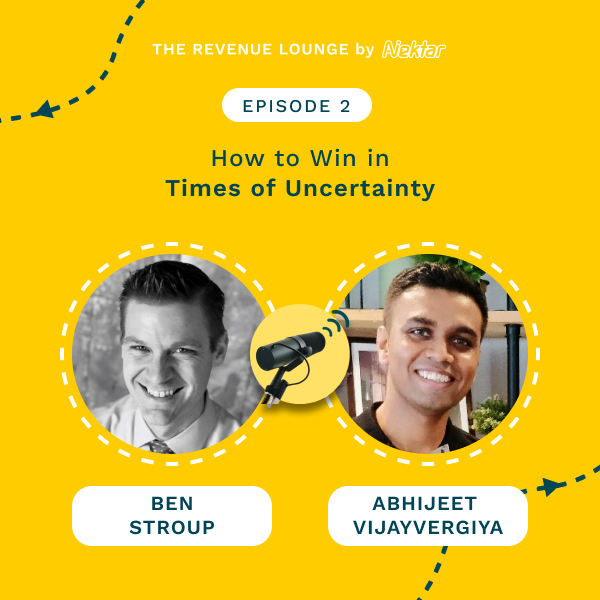
Ep #2: How to Win in Times of Uncertainty
Listen Now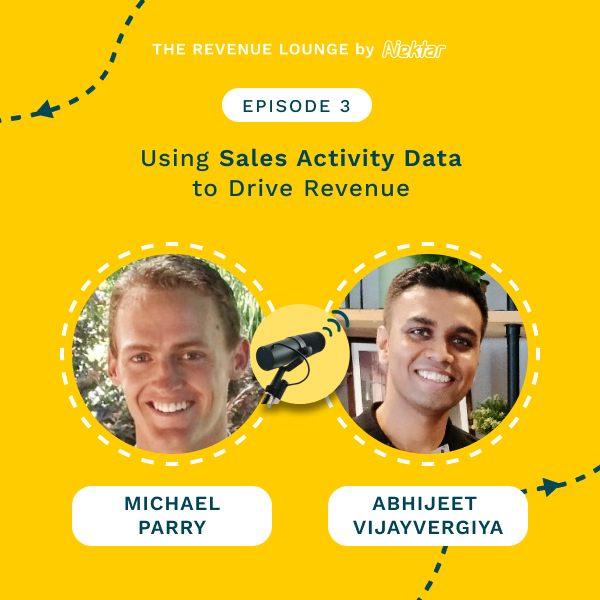
Ep #3: Using Activity Data to Drive Sales Productivity
Listen Now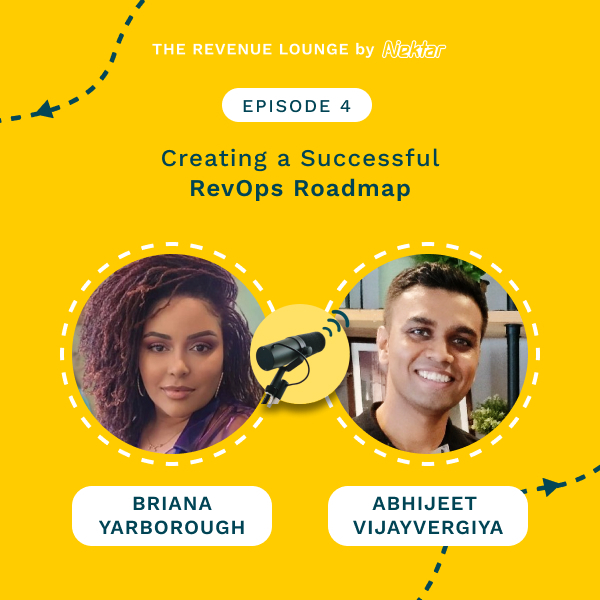
Ep #4: Creating a Successful RevOps Roadmap
Listen Now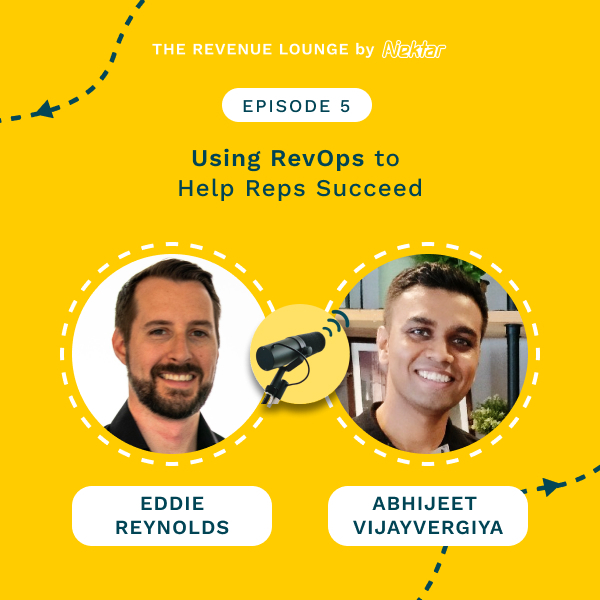
Ep #5: Using RevOps to Help Reps Succeed
Listen Now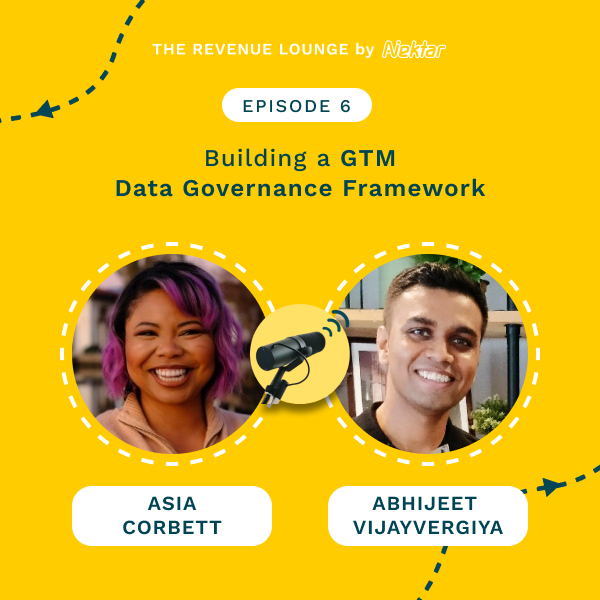
Ep #6: Building a GTM Data Governance Framework
Listen Now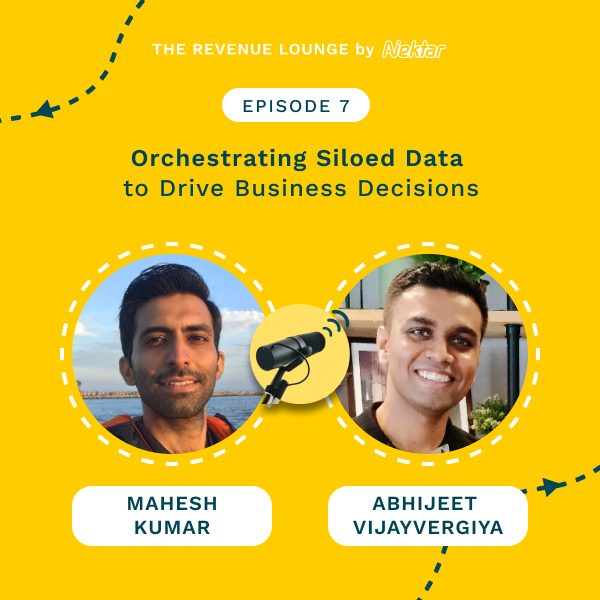
Ep #7: Orchestrating Siloed Data to Drive Business Decisions
Listen Now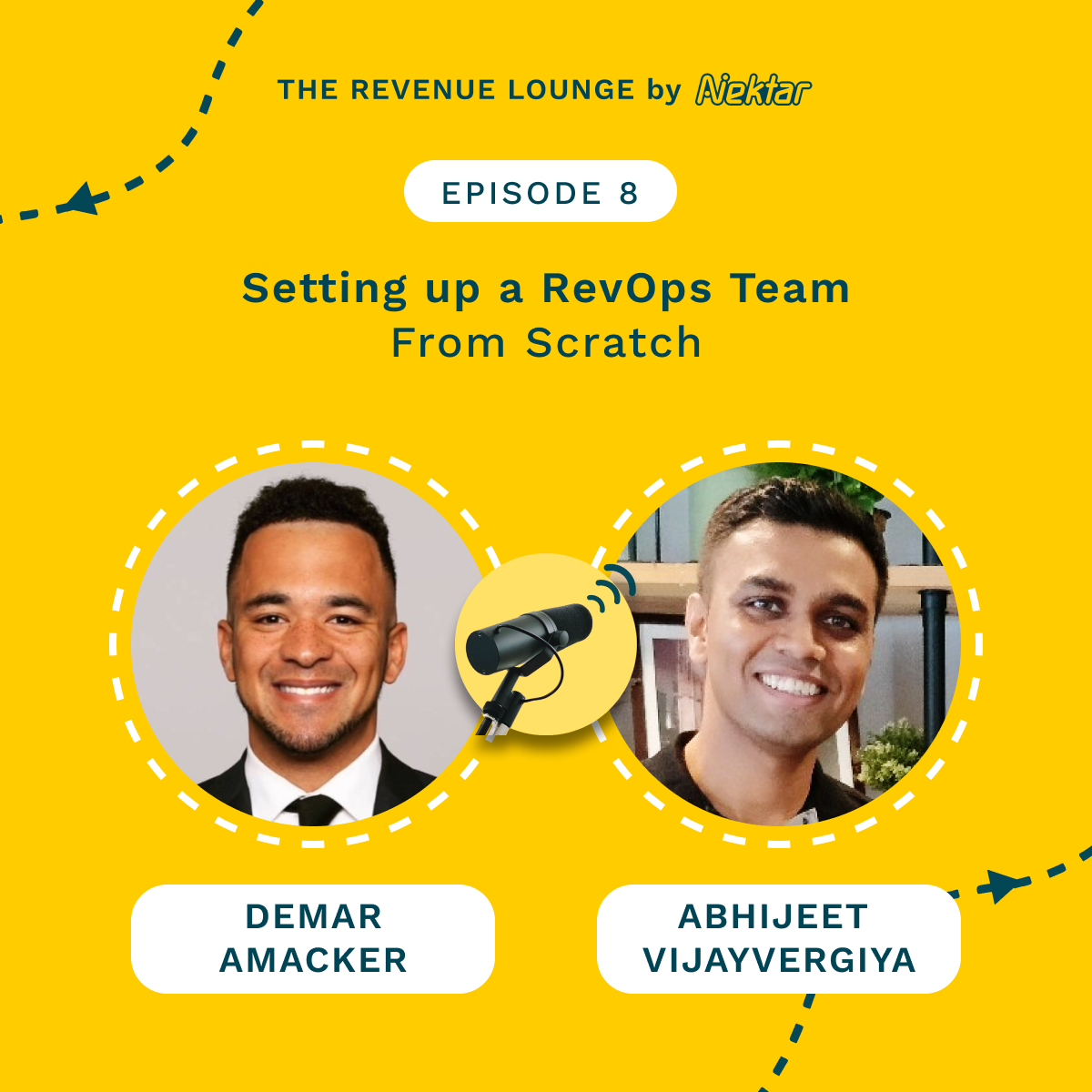
Ep #8: Setting Up a RevOps Team From Scratch
Listen Now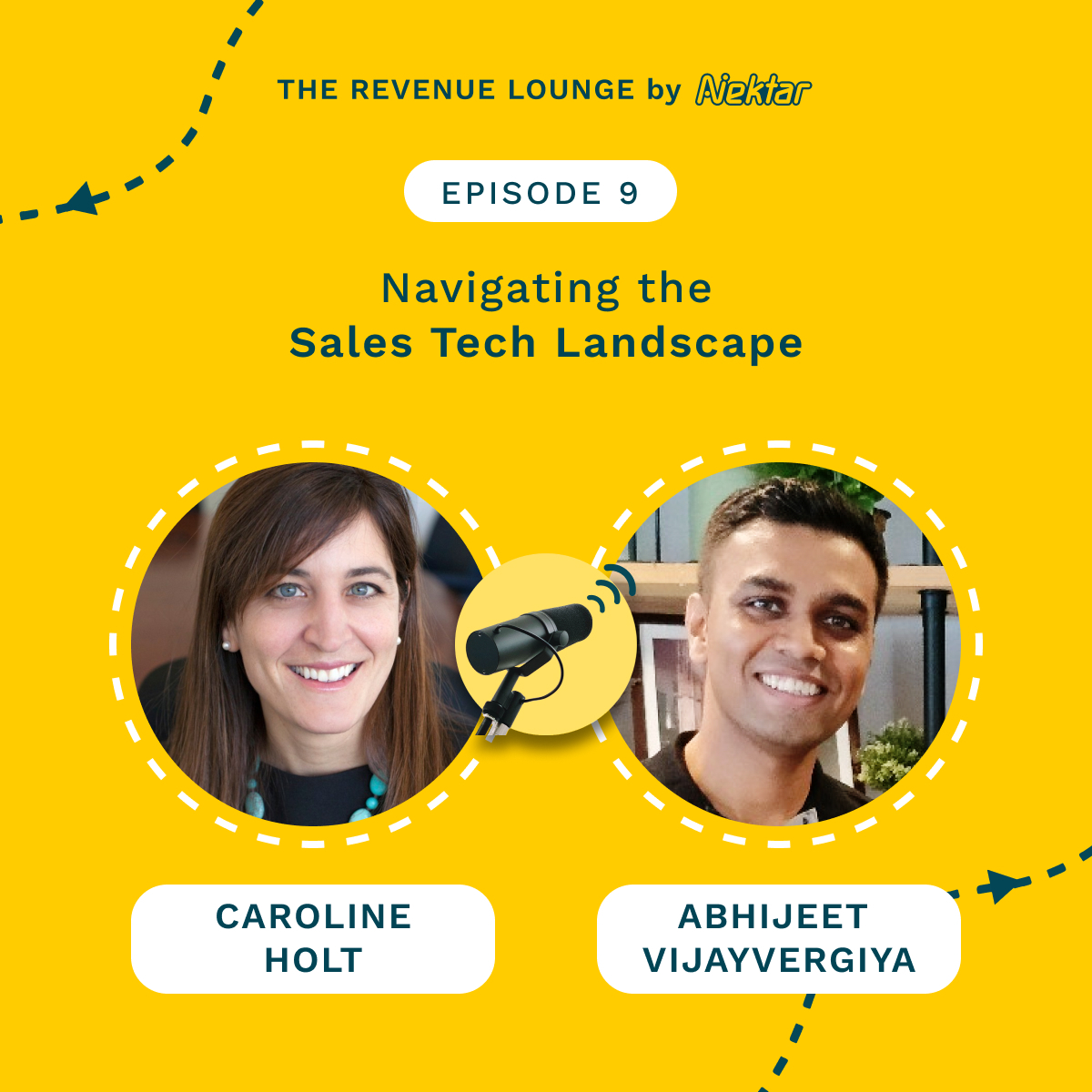
Ep #9: Navigating the Sales Tech Landscape
Listen Now